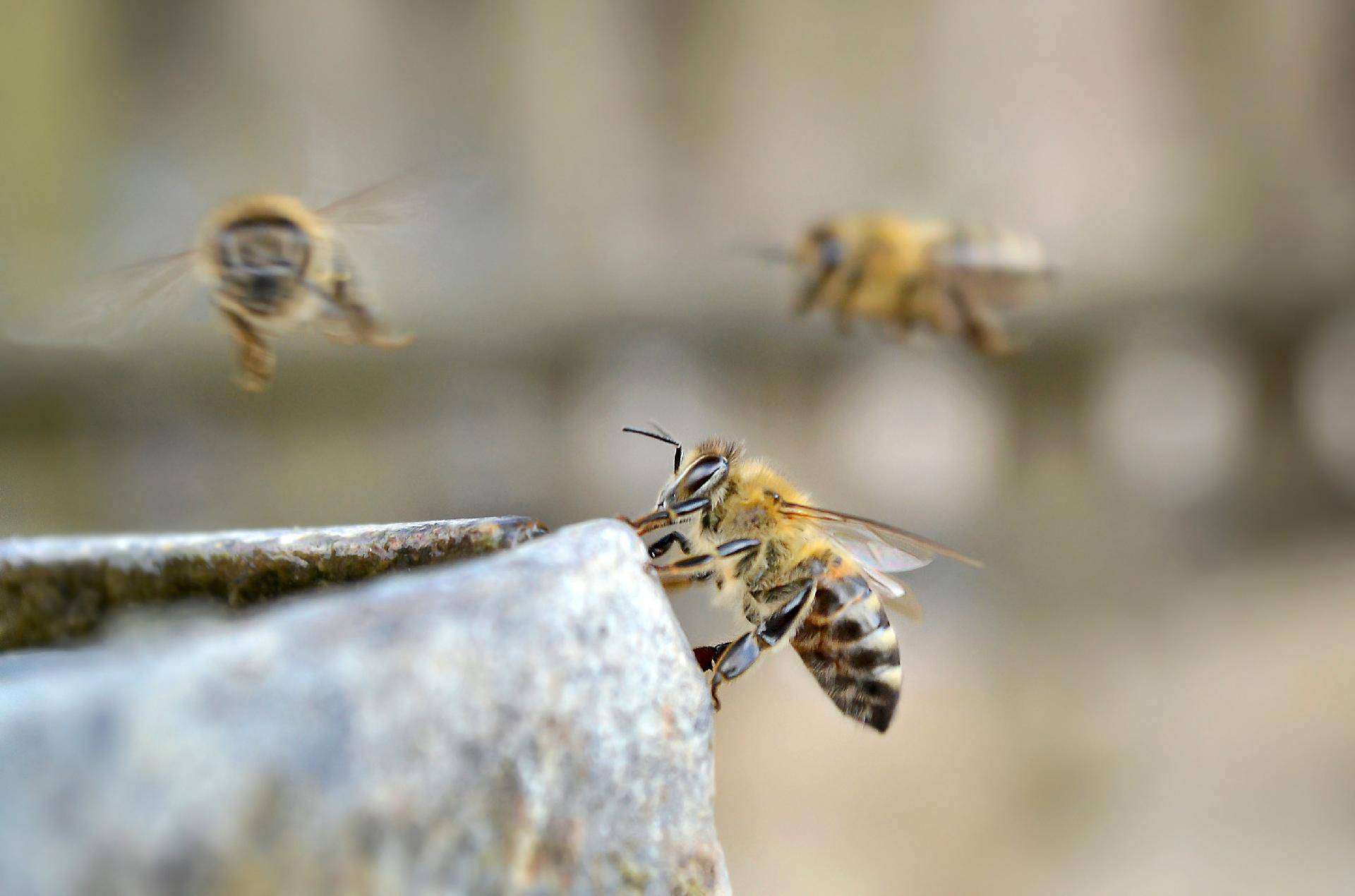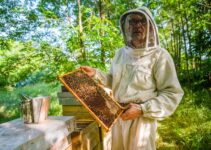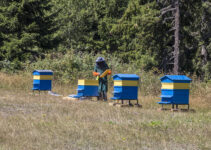We have known bees as the first and primary producer of honey, but their role doesn’t just stop there. They are one of the key reasons why we have food on the table and stuff to use. Think about those vegetables and fruits you consume every day as well as crops like flax and cotton. Bees might also be the rudimentary creator of your favorite beauty product. Just exactly how important are they?
Globally notorious pollinators, bees are responsible for at least one-third of the food we eat every day. Avocados, broccoli, melons, almonds, soybeans, and other imported and local vegetables and fruits require pollination. In addition, they also make a significant contribution to the economy and our mother nature.
Bees really are amazing, aren’t they? Perhaps the simple paragraph above can convince you enough that they are not just insects that sting human skin. They actually have a reason for doing that. Either as self-defense or to protect their hive from a potential threat. But generally, bees do not sting a person or anything without a motive. Here, we want to share the top five reasons why they are a valuable asset to humanity and the environment. For sure, you are familiar with most of them, but some might totally blow you away! Here’s to hoping 🙂
Do Bees Help Us?
Bees may be very tiny, but never underestimate their capability! From the delicious food we eat to our healthy environment and thriving economy, they help us in so many ways. We can consider them as one of nature’s super hardworking and responsible creatures that ensure everyone has a mouthful of nutrition on their kitchen counter and animals have a habitat they can call their own.
There are roughly 20,000 different types of bees–with honeybees encompassing most of the population. We commonly see them being kept and taken care of by beekeepers. The rest of the species are known as wild, which include the solitary bee and bumblebee. Being an incredible pollinator is the leading reason why we need these petite insects.
Along with birds, bats, and other insects, they visit various crops. Bees, however, are the most effective pollinators as they go to more crops (between 50 and 1000 flowers in a single visit) and transmit pollen between them to a bigger scale. That literally means yielding more harvests! We are not only talking about tasty fruit like apples, berries, and strawberries. It also includes healthy vegetables such as beans and peas.
The bumblebee, for example, is commercially used in the UK as a food crop pollinator, specifically for soft fruits, tomatoes, and alike. All thanks to their shape, size, and capacity to vibrate dynamically. Whereas in the US, approximately 80 percent of the crops are honeybee-reliant. The insects are also used to pollinate alfalfa and clover to provide nourishment for the livestock.
Top Five Reasons Why Bees Are Important
Perhaps you enjoy a creamy, rich cup of coffee or juicy berry smoothies. Not to mention those beautiful flowers and plants that are hard not to appreciate. Still a bit curious as to what bees can do for us? Join us as we unveil five good reasons why these creatures deserve our care and attention!
1. Bees Secure Food Availability
We are currently facing a growing population, nonstop pollution, and threatening diseases. We need more food to feed all the starving stomachs and at the same time maintain healthy well-being to prevent sicknesses. Thanks to food producers like bees, we are able to get good quality, wide-ranging, and balanced nutrition.
As you’re aware, bees help us generate food through pollination – popularly recognized as plant fertilization and reproduction. It transports pollen from the anther (male flower part) to the stigma (female flower part) to give us leaves, seeds, and roots, in addition to fruits, nuts, and berries. So, pollination, in general, helps improve crop quality and boosts the nutritional value and shelf life of harvests. It sustains around 87% of leading crop production and impacts 35% of agricultural land globally.
The ever-popular honey, pollen, and royal jelly are the main foodstuffs of these critters. But you can also find them in other manufactured products, such as propolis and beeswax, usually used in furniture luster and skincare products. The sticky, syrupy golden liquid (honey) is perhaps the most famed and valuable product of bees, and it is not only due to its gooey taste. Several types of research confirm its medicinal benefits, like treating wounds and burns, improving cholesterol, reducing blood pressure, and lowering the risk of heart disease.
Different bees possess different unique characteristics to pollinate specific plants. For instance, early bumblebees have the agility and miniature size that make them a perfect pollinator of plants with loose flowers. Not to mention, their long tongue can seamlessly cross-pollinate deep flowers. Farmers with apple blossoms heavily rely on red mason bee’s free natural fertilization services. It is said to be 120 times more efficient compared to honeybees!
Just because only one-third of our diet comes from pollinators doesn’t mean we should see them as less important. Did you know that once bees stopped cross-fertilizing our farming goods, some of the foods we love would no longer be available for consumption? Imagine a dessert course without cherries or a soup with no broccoli or pumpkin. The accessibility of cantaloupes, asparagus, almonds, and watermelons may also become rare to out-of-bounds.
2. Bees Provide Food and Habitat for Animals
Mammals and birds may be dependent on seeds, berries, nuts, and fruits to survive day-to-day living, and they need bees to pollinate these foods. Even domesticated animals benefit from cross-pollination to have something to put in their tummy. Take cows, for example. They eat alfalfa, which is bee-pollinated.
Humans are not the only ones who love eating honey. Wild residents will also take any chance they have once they spot an open hive to get honey and larvae to eat. Aside from insects, animals such as raccoons, birds, and bats and bears are also distinguished hive raiders.
Another fascinating benefit of bees is their capability to save elephants. It may seem impossible to some because we know how gigantic this animal is compared to the tiny bee, so what’s the fuss?
Africa is universally known as the country with the greatest number of elephants – with a staggering population of more than 400,000. It has resulted in a conflict between human and this particular animal because their crops are at risk. That would mean losing their means of living. It turns out that elephants are afraid of bees, so residents consider it an advantage. They decided to use the insects to save not only their crops but also the elephants.
They created the “Bee Hive Fence” project through the use of honeybees. It deters elephants from raiding farms whilst gaining from the bees’ crop pollination simultaneously. And since elephant numbers are in a dire condition at present, this project will also help the natives to prevent animal killings and preserve their lives for the longest time.
You can watch a video all about this amazing feat here.
3. Bees Support Our Economy
Agricultural production has boomed over the past years, and we should also give credit to bees for this continuous success. Around eighty percent of food in grocery stores comes from pollinated crops, including celery, avocado, cucumber, blueberry, and apple, to name a few. Bees are responsible for pollinating 200 million pounds’ worth of crops in the UK and $15 billion of crops in the US.
Here are other interesting statistical figures worth noting:
- About 30 percent of food consumed by North American residents is derived from pollinated plant life of bees – with an estimated $16 billion figure solely in the United States. Honey production also increased, with nearly a total of $208 million. (2007)
- The UK economy profited to the tune of over $200 million annual income from insect pollination in 2008, then augmented to $281 million in 2009. A total of 39 industrial crops benefit from the self-fertilization services offered by bees.
- The US produces about $225 million of honey each year for commercial use and consumption, such as anti-aging creams and lotions. The honey crop reached more than $300 million in 2013 alone.
So, can you imagine what our economy would be without the work of bees?
Out of 100 top food crops worldwide, 70 of them rely on pollinators to grow and feed us. According to the study of Nature Communications, 2% of wild bees visit and pollinate 80% of crops worldwide.
So, the message is very clear. Without these little bees, we can say goodbye to some of the world’s favorite food. Worse, our agricultural system might suffer from an extreme loss. And no, we are not only talking about millions. There are billions of dollars at stake as a whole!
4. Bees Protect the Environment
We don’t know about you, but we would rather spend our years living in a country full of gorgeous flowers and plants. Well, aside from being healthy to our lungs and general well-being, they give us this scenic vibe that even the tallest buildings or long, decorative city bridges cannot outdo.
Making the planet greener takes a lot of effort. It takes more than sunshine, soil, and water. It also requires the help of industrious pollinators. Ninety percent of our plants must be pollinated to develop and thrive. In most countries, bees are the most important pollinators.
As we have mentioned earlier, a large number of agricultural vegetables and fruits heavily depend on pollinators to flourish. But other than those, several types of wild plants also utilize bees to help them generate enough food for wild animals. So, if bees disappear, it would hurt the plants and animals.
Moreover, these critters strengthen the growth of trees and flowers; therefore preserving the natural beauty of our land. Even non-fruit trees need bees in order to survive and support much wildlife. Examples are hawthorn, hazel, and horse chestnuts.
Did you also know that some bees serve as indicators of our ecosystem’s condition? Most likely, it is an important thing that many of us do not entirely recognize. Their nonappearance, quantity, or presence indicates when something is happening. Like for instance, their continued decline could mean our environment is not in its usual healthy shape.
5. Bees are Essential to Livelihood
As per the report of the US Department of Agriculture, there are 212,000 beekeepers within the country. Around 1.5 million people profit directly from honeybees. All of these contribute to making bee farms one of the dominant sources of livelihood.
These creatures primarily help farmers and beekeepers to earn money. But the good news, students, stay-at-home moms or dads, or anyone looking for extra income can also gain a decent amount by preparing and selling bee-pollinated products (e.g., candles and cosmetic products), managing the colonies, or providing pollination services.
Again, thanks to pollination, farmers are able to improve their crop production rates by up to 30%. It also includes spices and coffee, besides fruits and vegetables. Many international organizations help communities to cross-pollinate food crops while getting a sustainable living. Aside from farmers, more than 20,000 individuals count on honeybees, or what we call beekeepers.
Whether you’re looking for a sideline or full-time job, beekeeping can definitely keep you busy for the coming years. Bee related products will always be a massive hit among consumers, and now could be the perfect time to invest in this profitable venture. It would only cost you a minimum of $300 and a maximum of $500 to start your own business with one hive and colony of bees.
You might be wondering what sort of income you can make with bees. You actually have loads of options, with honey on the first list due to its high demand, yet the production cost is only nominal. You have to learn the exact harvesting and packaging process, then ready to sell. Since we have different palates, you can be as creative as you want to present your raw product. It could be adding another fruit ingredient or anything natural that will capture your buyer’s taste.
If you prefer less laborious work, try selling pollen or propolis. Pollen acts as our nutritional supplement owing to its protein content, while propolis is famous for its medicinal properties. You only need small amounts, plus they have high demand than supply, so you’ll get a quick return of cash. Other options include selling bee equipment or products, being a supplier of pollinator seeds, and providing services like swarm removal.
But of course, entering this form of business could be a hit or miss, and you’ll need ample space to start with. It should be away from populated areas as possible and won’t interrupt bees. A rural area is much more preferable because it is clear of the city’s buzzing noise. They would be keener on doing their work to provide you with enough supplies.
Bonus: Bees Can Detect Explosives
Believe it or not, bees are trained since 2007 or earlier to track down bombs, and the result is promising. It’s like they are working as crime dogs. They are predominantly used as a form of security for US homelands, though their application is also notable in the Iraq war.
How do bees perform this sensitive work?
Researchers expose them to the smell of explosives such as C-4 plastic and dynamite. If dogs are given treats as a reward, bees find contentment in sugar water. Once they detect there is any form of bomb somewhere nearby, they extend their proboscis. It is the tube they use for feeding on nectar.
Given their tiny form factor, bees can be transported in a handheld detector with a size similar to a shoebox. They could be beneficial in sniffing out bombs in roadside security checks, airfields, or any area that requires rigorous safety.
Other than explosives, sniffer bees can also hunt for radioactive metals and pesticides in landmines. With enough training, they could potentially be a valuable asset to recognize other unlawful and dangerous materials, let’s say, in the next five to ten years.
But here’s another one!
If you’re still up for an intriguing story, this experiment from the scientists in the Netherlands may stir your interest. Bees are trained to detect COVID-19 infections. We have been extremely affected by this global pandemic, and specialists continue to search for innovative ways to cure or at least prevent the spread of the disease. That’s why they came up with this rare research. They also reward bees with sugar water along with the infected samples they present. If they stick out their proboscis, it confirms a positive virus test.
Wrapping it up, bees are important because they make one-third of our food, protect animals and the environment, help our economy continuously flourish, and support our farmers and beekeepers. That’s why we should do our part to save these hardworking workers, especially in today’s population decline. One way is through planting a garden in your backyard that bees will love staying and going around. Sure, we would still survive, even without their existence. But at the end of the day, isn’t it better to have a safer ecosystem, livelier plants, and a more nutritious diet?
Sources:
https://www.weforum.org/agenda/2016/02/to-bee-or-not-to-bee-11-reasons-pollinators-matter/
https://www.pollinator.org/pollinators
https://www.woodlandtrust.org.uk/blog/2018/07/why-are-bees-important-and-how-you-can-help-them/
https://www.onegreenplanet.org/animalsandnature/why-bees-are-important-to-our-planet/




